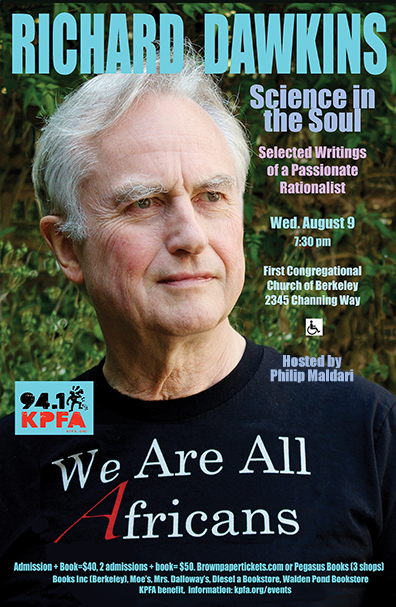 I had a feeling that this brouhaha over Richard Dawkins at KPFA would happen. My involvement with the station these days is pretty minimal, but a couple of Sundays ago I dropped by as a guest on my friend Sherry Gendelman’s wonderful classical music show Piano. As we entered the Berkeley, California signal’s building entrance, I saw the poster for Dawkins’ appearance.
I had a feeling that this brouhaha over Richard Dawkins at KPFA would happen. My involvement with the station these days is pretty minimal, but a couple of Sundays ago I dropped by as a guest on my friend Sherry Gendelman’s wonderful classical music show Piano. As we entered the Berkeley, California signal’s building entrance, I saw the poster for Dawkins’ appearance.
“Wow,” I thought to myself. “Richard Dawkins on KPFA. Really?” Ten days later the speaking event cancellation made The New York Times, answering my question. “Well, yeah, not really,” I responded to the initially surprised me.
KPFA says that it cancelled Richard Dawkins after discovering his Islamophobic comments. To be fair, Dawkins insists that he is not an Islamophobe; we’ll get to that later. But I don’t think that’s the deeper reason why the Dawkins talk was scotched. I think that the cancellation happened because KFPA runs on a revenue/speech model that limits the possibility of Dawkins or anyone like him from speaking.
@ToddKincannon I think Islam is the greatest force for evil in the world today. I’ve said so, often and loudly.What are you talking about?
— Richard Dawkins (@RichardDawkins) March 1, 2013
Before we get to that, I suppose I should say that I’ve never been much of a Dawkins fan. I read The Selfish Gene as a nicely couched exercise in biological determinism. I view his atheism as just another blend of fundamentalism. As for Dawkins himself, I experience him as Bill Maher without the jokes.
And I thought all this even before he jumped on the Islam-Is-Bad-Bad-Bad bandwagon. In 2013 Dawkins famously tweeted that “Islam is the greatest force for evil in the world today. I’ve said so, often and loudly.” Since then his defenders have said that the comment was taken out of context. But that’s almost a tautology. Everything on Twitter is out of context. Free advice: if you want to say something in context, don’t say it on Twitter. In any event, subsequent Dawkins walk back comments have emphasized that “Individual Muslims suffer more from Islam than anyone else” (um, perhaps more than a few disagree given that they are still Muslims?) and of course Dawkins has condemned Trump’s travel ban. The problem is that the political impetus for the ban was surely bolstered by comments like, well, “Islam is the greatest force for evil in the world today.”
Having said all this, I still think it would have been fine, even fun, for Dawkins to appear on KPFA (he has done KPFA events before). The problem is that the KPFA on which Dawkins could flog his latest book, even after his comments were discovered, does not exist. KPFA’s founder Lewis Hill tried to make it exist in the 1950s. He envisioned a radio station that encouraged radical dialogue, a venue where he and his fellow pacifists and anarchists would invite the world in to answer their questions. Everybody would have a say, from communists to Daughters of the American Revolution. But the questions would come from Hill and his circle of World War II era conscientious objectors. KPFA’s politics, then, would manifest itself not by restricting the range of participants, but by curating the questions that they had to address.
Alas, Lewis Hill quickly discovered that this kind of ambitious goal costs money, which his station did not have. Then as McCarthyism cast its long, polarizing shadow and Hill’s health deteriorated, he took his own life. The inheritors of his legacy now settled for a different project: KPFA and the Pacifica Foundation’s four other radio signals would broadcast “dissent,” the voices of the American left excluded from the rest of media. As the philosophy of “community radio” emerged in the 1970s, various identities queued up to be added to the list of marginalized voices. Today this strategy persists as a kind of palimpsest, a hodgepodge of broadcasting traditions, each written over the prior. But the end result is pretty consistent: when KPFA hosts an event, it always functions as an implicit endorsement of the event guest.
In this context, the Dawkins talk was a dead duck. KPFA simply cannot sustain a marathon premium program or event speaker who is not beloved to the station’s followers, or at least a critical mass of them. KPFA streams to a small, passionate audience of people who pay the operation money to be told what they already think is true, to be reassured rather than challenged. Sometimes this praxis runs into trouble when the latest proprietors can’t agree on the current party line. And sometimes the norm is pleasantly broken on the station’s regular non-fundraising schedule, but the exceptions invariably prove the rule.
Why I am writing this? Not because I think that my words will provide some impetus for KPFA to change. America’s longest running listener supported radio station has many virtues, but I’ve given up on all that. No, I just want to say that I hope that someday, someone, somewhere, will take up Hill’s mission again, his mission of radical dialogue, and create a radio station whose audience will be willing, even happy, to come to listen to Richard Dawkins speak and then ask the great man why he would say such dumbass things on Twitter.
This essay was edited on July 27.


